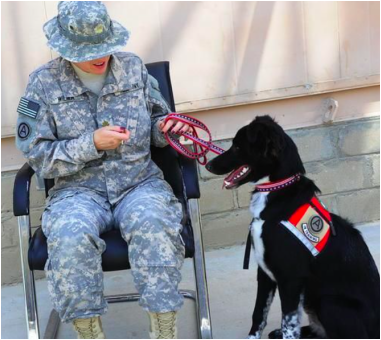 Animals support soldiers and civilians through the Red Cross human-bond program. Photo by The US Army.
Animals support soldiers and civilians through the Red Cross human-bond program. Photo by The US Army. Emotional service animals, or ESAs, help those with disabilities that may not be obvious to the naked eye, such as
- Depression
- Post-traumatic stress disorder (PTSD)
- Anxiety and social phobias
- Bipolar Disorder
- Autism spectrum disorder
- And more.
 Emotional support animals are differentiated from pets in public with these sporty red vests. Photo by USA Dog Service Registration.
Emotional support animals are differentiated from pets in public with these sporty red vests. Photo by USA Dog Service Registration. Unlike service and therapy animals, ESAs usually start out as pets and go through no specific training to don their titles. Rather, it’s their presence, their bond with and responsiveness to their owners’ moods and needs that designate their therapeutic value, rather than actions they are trained to do. Also unlike service animals, almost any animal can become an ESA--ferrets, cats, rabbits and more can qualify.
Like service animals, ESAs can accompany their human counterparts into public spaces, on modes of public transportation and other areas pets aren’t generally allowed to go. In many states, people utilizing ESAs don’t have to pay a pet deposit for rental housing like they would if their animal did not have a therapeutic value. But not all pets can become ESAs. To designate your companion animal as an emotional support animal, you must
- be under a doctor’s care for a treatment of a mental or emotional disability
- sustaining a disability that substantially limits your life in a major way
- have your doctor prescribe your animal as a necessary part of your treatment.
Once prescribed, you’ll receive a letter designating your animal as an ESA, which you can show to landlords and other institutions who may need documentation to the effect. This letter will qualify your animal without disclosing your diagnosis to keep that information confidential. Most businesses and other public places where animals aren’t generally allowed will require your ESA to wear a red service vest, resources for which are found at places like the National Service Animal Registry or USA Service Dog Registration. This quickly identifies them as support animals rather than pets.
Emotional support animals enrich and improve the lives of their humans. Their responsiveness help in ways that augment medications and other therapies in a wonderful, life-changing way.
 Jennafer Martin is a professional writer and pet psychic, helping humans and animals better understand one another. Read articles on the emotional lives of pets at PetInsightsByJennafer.com. |










 RSS Feed
RSS Feed